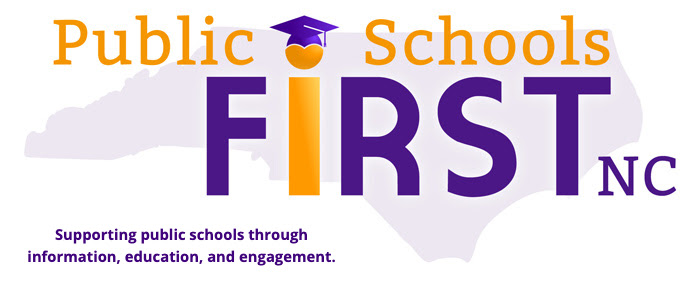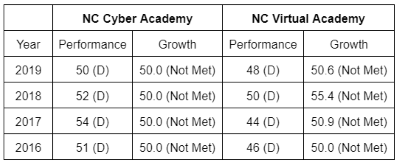North Carolina has a problem. The public consistently chooses to put its children in public schools, but the Tea Party-dominated General Assembly (legislature) favors privatization. No matter how poorly the charter schools and voucher schools perform, the General Assembly wants more of them. I wonder why? Is is campaign contributions or just hostility to anything public?

publicschoolsfirstnc.org
June 18, 2022

Time to Reconsider Virtual
Charter Schools?
After strong criticism of remote learning during the pandemic by the NC General Assembly and repeated legislative efforts to encourage districts to return to in-class instruction, it would be natural to think that the NC virtual charter schools, which are 100% remote, should come under increased scrutiny.
Instead, the opposite happened. Last week, SB671, Edition 3 (Virtual Educ./Remote Acad./Virtual Charters) was introduced, which if passed into law, would allow NC’s two virtual charter schools to be upgraded to full charter status with NO REVIEW. The bill passed through the House with little discussion. As part of SB671, the “two pilot virtual charter schools…shall be deemed to be approved as charter schools by the State Board of Education.” In addition, they are allowed to increase enrollment by 20% each year based on their 2021-22 enrollment for the next five years, when their charter may be renewed for 10 more years.
In the 2017-18 SY, two virtual charter schools, North Carolina Cyber Academy (formerly NC Connections Academy) and NC Virtual Academy opened as pilot projects. Because similar virtual charter schools had seen poor outcomes in other states, NC did not want to grant full charter status until the schools had proven themselves. The experiment has not gone well. In the years for which there is performance data (see NC School Report Cards), neither school achieved above a D performance grade or higher than 55 in growth. The NC Cyber Academy earned the lowest possible growth score (50) all four years.

In addition, both schools currently serve a lower percentage of economically disadvantaged students than the state overall and have much lower four-year graduation rates.
2020-21 Economically Disadvantaged Students
- State: 38.9%
- NC Cyber Academy: 31.5%
- NC Virtual Academy: 32.4%
2020-21 Four-Year Graduation Rate
- State: 87.0%
- NC Cyber Academy: 54.9%
- NC Virtual Academy: 77.5%
In a classic example of the privatization of public education, The NC Virtual Academy is powered by Stride K-12, an online learning company traded on the NY stock exchange. While the company’s investors may be getting good returns on their investment, the NC taxpayers are not.
SB671 also introduces an option for public school districts to apply to the State Board of Education for approval to operate small virtual academies enrolling no more than 15% of their students. The bill lists seven required elements for a district’s plan including (#3) Hardware, software, and learning mgmt. platforms that support online learning, (#5) The professional development that will be provided to those teaching in the remote academy related to the pedagogy of providing remote instruction, and (#6) The identified characteristics for successful remote learning…. In addition, clear evaluation guidelines are set out to ensure that the remote academies do not provide a sub-standard education. These and other elements of SB671 are steps that could allow public schools flexibility to meet the needs of their students.
When SB671 went to the Senate for a vote this week, members found too many differences between their original version of SB671 – Edition 2 (Changes to the K-12 Scholarship Programs) and the House’s Edition 3. On a vote of 0-42, members sent the bill to a Conference Committee to iron out the differences. This delay provides an opportunity for NC citizens to reach out to committee members to voice their opinion on the various elements of the bill and what to keep or remove. House members have not yet been identified. The Senate members are
The past few years have given NC educators, students, and parents plenty of opportunities to see the positive and negative aspects of virtual instruction. Implementing lessons learned and evaluating results as we move forward are critical next steps. SB671 does the NC virtual charter schools a disservice by excluding them from an evaluation of their pilot stage performance

Where is all the anger at the teachers? Why aren’t angry mobs storming the Assembly? I don’t understand why no one is threatening any principals because, in my experience, when you teach online, half the country turns against you in froth mouthed rage. Virtual charters should roil anyone who stopped wearing a mask long ago. I suppose I’ll just have to stop trying to figure out what goes on in the heads of some people.
so many EMPTY heads, too
I am not generally a fan of charter schools but I believe having a virtual option within the public and/or charter system is important because it may provide a viable option for students who cannot attend in-person public schools- for example students with medical issues( undergoing chemotherapy is one example) or psycho/social issues ( school anxiety) or unable to be physically present ( high level athlete)even students who are above / behind their grade level for some reason. Rather than be anti- virtual leaning ( it is not for everyone but some of my students thrived with online learning) perhaps the emphasis should be on making virtual learning better and developing metrics to check that students are obtaining requisite milestones that will help them become successful.